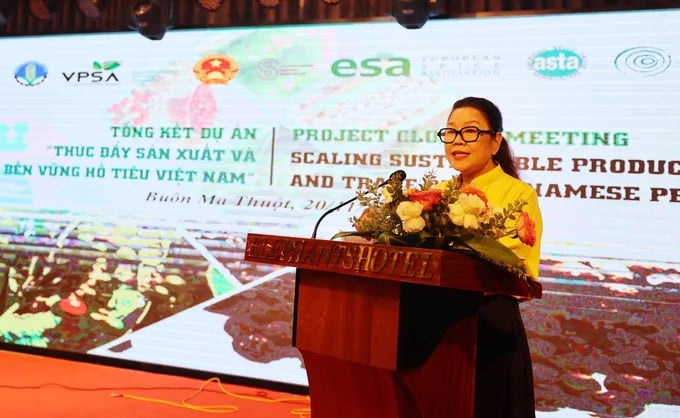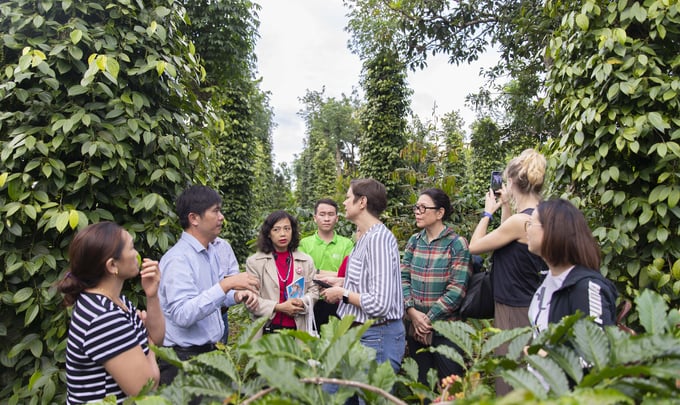May 16, 2025 | 10:27 GMT +7
May 16, 2025 | 10:27 GMT +7
Hotline: 0913.378.918
May 16, 2025 | 10:27 GMT +7
Hotline: 0913.378.918
On November 20 in Dak Lak, the Industrious Trade Initiative (IDH), in collaboration with the European Union Delegation in Vietnam, the Department of Plant Protection, and the Vietnam Pepper and Spice Association, along with partner organizations, successfully launched the comprehensive project titled "Promoting Production and Trade of Vietnamese Pepper."
Funded by the European Union (EU) and IDH, this initiative is scheduled for implementation from 2021 to 2023, spanning three provinces: Dak Lak, Dak Nong, and Gia Lai.
The project forms part of the EU's ASEAN Regional Integration Support from the European Union (ARISE Plus) program, financially supported by the EU to assist the Vietnamese Government in reaping benefits from bilateral trade commitments and economic integration. Notably, it focuses on realizing the objectives outlined in the European Union-Vietnam Free Trade Agreement (EUVFTA), facilitating the export of high-quality products and services from Vietnam to the EU.
The Central Highlands region is recognized as the main producer of numerous industrial crops, and pepper constitutes 63%. Research indicates that there has been a significant surge in the cultivation of pepper crops, with people extensively expanding their agricultural operations onto unsuitable topography and soil, thereby causing a disturbance in the ecological balance.

Ms. Phan Thi Van, Director of IDH Vietnam, emphasized that the project has instigated a profound and sustainable transformation in large-scale pepper production and export. Photo: Quang Yen.
Over the course of three years, the project has yielded remarkable results, witnessing a 60% increase in pepper production volume to meet the stringent requirements on pesticide residues set by the high-end market. The estimated value of certified pepper exports for 2023 is an impressive 600 million USD. Notably, 50% of pesticide dealers have committed to adhering to regulations on pesticide management. The initiative has also achieved a remarkable 98% reduction in the use of banned pesticides, particularly herbicides, fungicides, and insecticides, addressing market concerns regarding high residue levels.
The positive impacts extend to nearly 8,000 households engaged in pepper cultivation across 8,500 hectares in the Central Highlands, significantly improving their quality of life.
The project has successfully mobilized the participation of 12 leading pepper-producing and exporting enterprises and cooperatives in Vietnam. Seven final buyers have pledged their commitment to supporting and contributing to the overarching goal of fostering sustainable pepper production and trade. Additionally, 14 Agricultural Service Teams (Agriteams) have been established to offer agricultural services, consultation, and monitor the responsible use of chemicals by farmers. A total of 160 training courses for farmers have been conducted.
As part of the project, farmers receive extensive knowledge dissemination and guidance on implementing Good Agricultural Practices (GAP), Integrated Pest Management (IPM), Plant Health Management (IPHM), and comprehensive government-mandated regulations. These efforts contribute to a reduction in input materials, leading to a 10% decrease in carbon emissions and a 17% reduction in irrigation water usage.
Ms. Phan Thi Van highlighted the challenges faced by the pepper industry in the Central Highlands due to rapid development in recent years. The sector is confronted with potential risks that could jeopardize Vietnam's international competitiveness in terms of both quality and price, ultimately impacting the livelihoods of pepper-growing households.

Ms. Van affirms that the project, titled "Promoting Sustainable Production and Trade of Vietnamese Pepper," has indeed ushered in a truly sustainable transformation in large-scale pepper production and export.
She emphasized, "IDH remains dedicated to supporting the ongoing sustainable development of Vietnam's pepper industry. Moving forward, IDH aims to intensify efforts in mobilizing investment participation from both the public and private sectors, seeking to replicate the successful outcomes of this project."
Furthermore, IDH plans to maintain its collaboration with the Ministry of Agriculture and Rural Development, the Vietnam Pepper and Spice Association, and Vietnamese spice businesses. The focus will be on the development and implementation of programs that specifically address residue management issues related to the use of pesticides, with the overarching goal of improving people's livelihoods. Simultaneously, IDH is committed to supporting Vietnam's spice industry in meeting emerging market requirements pertaining to social and environmental concerns," Ms. Van concluded."
In the first 10 months of this year, Vietnam shipped nearly 75,000 tons of cinnamon abroad, earning 220 million USD, becoming the world’s biggest exporter of the product. Last year, Vietnamese cinnamon accounted for 18.2% in output and 34.4% of the export market share globally.
India is Vietnam’s biggest importer, accounting for some 44% of the market share, followed by the US and Bangladesh. According to the Vietnam Pepper and Spice Association, Vietnam is lacking a national-level strategy on sustainable development of cinnamon sector.
Translated by Quynh Chi

(VAN) Cold-barn systems efficiently manage environmental and temperature conditions, which aids in the prevention of respiratory diseases in pigs and protects them from the vectors that transmit African swine fevers.

(VAN) To tackle challenges, the project 'Addressing key technical bottlenecks in the grouper supply chain in Vietnam' has been underway since 2024.

(VAN) The project 'Disease-Resilient and Sustainable Cassava Production Systems in the Mekong Region', funded by the Australian Center for International Agricultural Research (ACIAR), is being implemented from 2024 to 2028.

(VAN) Data from 10,000 farming households will help professionalize production organization and support the implementation of the One Million Hectares Program for High-Quality, Low-Emission Rice Cultivation.

(VAN) FAO Director-General QU Dongyu marks International Day of Plant Health at NENA conference.

(VAN) Deputy Minister of Agriculture and Environment Hoang Trung affirmed that floriculture and ornamental plants are a growing industry that receives significant global attention.

(VAN) The three staple crops dominating modern diets – corn, rice and wheat – are familiar to Americans. However, fourth place is held by a dark horse: cassava.